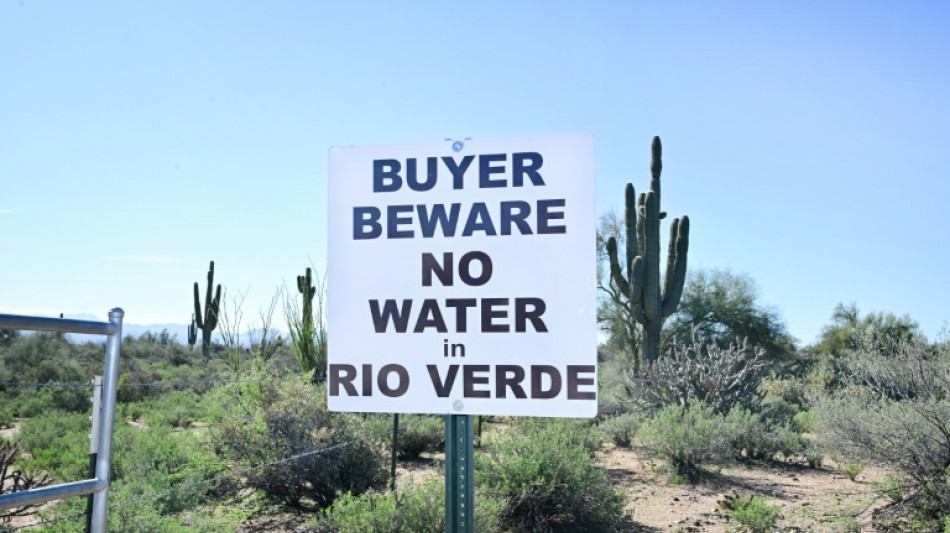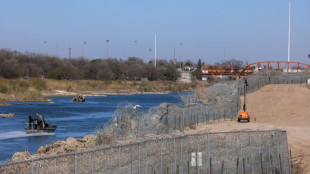
-
 Mbappe can be Real Madrid 'legend' like Ronaldo: Ancelotti
Mbappe can be Real Madrid 'legend' like Ronaldo: Ancelotti
-
Saka 'ready to go' for Arsenal after long injury lay-off: Arteta

-
 Aston Martin to sell stake in Formula One team
Aston Martin to sell stake in Formula One team
-
Three talking points ahead of clay-court season

-
 French court hands Le Pen five-year election ban
French court hands Le Pen five-year election ban
-
Probe accuses ex J-pop star Nakai of sexual assault

-
 Japan leads hefty global stock market losses on tariff woes
Japan leads hefty global stock market losses on tariff woes
-
Saka 'ready to go' after long injury lay-off: Arteta

-
 Ingebrigtsen Sr, on trial for abusing Olympic champion, says he was 'overly protective'
Ingebrigtsen Sr, on trial for abusing Olympic champion, says he was 'overly protective'
-
Tourists and locals enjoy 'ephemeral' Tokyo cherry blossoms

-
 Khamenei warns of 'strong' response if Iran attacked
Khamenei warns of 'strong' response if Iran attacked
-
France fines Apple 150 million euros over privacy feature

-
 UK PM urges nations to smash migrant smuggling gangs 'once and for all'
UK PM urges nations to smash migrant smuggling gangs 'once and for all'
-
Thai authorities probe collapse at quake-hit construction site

-
 France's Le Pen convicted in fake jobs trial
France's Le Pen convicted in fake jobs trial
-
Chinese tech giant Huawei says profits fell 28% last year

-
 Trump says confident of TikTok deal before deadline
Trump says confident of TikTok deal before deadline
-
Myanmar declares week of mourning as hopes fade for quake survivors

-
 Japan's Nikkei leads hefty market losses, gold hits record
Japan's Nikkei leads hefty market losses, gold hits record
-
Tears in Taiwan for relatives hit by Myanmar quake

-
 Venezuela says US revoked transnational oil, gas company licenses
Venezuela says US revoked transnational oil, gas company licenses
-
'Devastated': Relatives await news from Bangkok building collapse

-
 Arsenal, Tottenham to play pre-season North London derby in Hong Kong
Arsenal, Tottenham to play pre-season North London derby in Hong Kong
-
Japan's Nikkei leads hefty equity market losses; gold hits record

-
 Israel's Netanyahu picks new security chief, defying legal challenge
Israel's Netanyahu picks new security chief, defying legal challenge
-
Trump says US tariffs to hit 'all countries'

-
 Prayers and tears for Eid in quake-hit Mandalay
Prayers and tears for Eid in quake-hit Mandalay
-
After flops, movie industry targets fresh start at CinemaCon

-
 Tsunoda targets podium finish in Japan after 'unreal' Red Bull move
Tsunoda targets podium finish in Japan after 'unreal' Red Bull move
-
French chefs await new Michelin guide

-
 UK imposes travel permit on Europeans from Wednesday
UK imposes travel permit on Europeans from Wednesday
-
At his academy, Romanian legend Hagi shapes future champions

-
 Referee's lunch break saved Miami winner Mensik from early exit
Referee's lunch break saved Miami winner Mensik from early exit
-
Djokovic refuses to discuss eye ailment after shock Miami loss

-
 Mitchell magic as Cavs bag 60th win, Pistons and T'Wolves brawl
Mitchell magic as Cavs bag 60th win, Pistons and T'Wolves brawl
-
Mensik shocks Djokovic to win Miami Open

-
 Duterte lawyer: 'compelling' grounds to throw case out
Duterte lawyer: 'compelling' grounds to throw case out
-
What happens on Trump's 'Liberation Day' and beyond?

-
 Clock ticks on Trump's reciprocal tariffs as countries seek reprieve
Clock ticks on Trump's reciprocal tariffs as countries seek reprieve
-
Japan-Australia flagship hydrogen project stumbles

-
 Musk deploys wealth in bid to swing Wisconsin court vote
Musk deploys wealth in bid to swing Wisconsin court vote
-
Mensik upsets Djokovic to win Miami Open

-
 China manufacturing activity grows at highest rate in a year
China manufacturing activity grows at highest rate in a year
-
'Waited for death': Ex-detainees recount horrors of Sudan's RSF prisons

-
 Japan's Nikkei leads big losses in Asian markets as gold hits record
Japan's Nikkei leads big losses in Asian markets as gold hits record
-
Rescue hopes fading three days after deadly Myanmar quake

-
 'Basketbrawl' as seven ejected in Pistons-Wolves clash
'Basketbrawl' as seven ejected in Pistons-Wolves clash
-
Four men loom large in Microsoft history

-
 Computer pioneer Microsoft turns 50 in the age of AI
Computer pioneer Microsoft turns 50 in the age of AI
-
Trump calls out both Putin and Zelensky over ceasefire talks


Paper plates and short showers: life with no water in Arizona
With its cactus-filled garden and breathtaking views of the rocky peaks of the Arizona desert, Wendy and Vance Walker's home in the Rio Verde Foothills seemed to be a little slice of paradise.
Until the water was cut off.
The neighboring city of Scottsdale decided it could no longer afford to sell its dwindling supply from the Colorado River, as a decades-long drought bites the American West.
For three months, the couple have eaten from disposable paper plates, had lightning-quick showers only every few days and collected rainwater to flush their toilets.
"A lot of people don't take the drought seriously," said Wendy, as she stood in the kitchen of their $600,000 home.
"And we, even though we live in the desert, we really didn't take it seriously either.
"Until you have to."
- Tankers -
Homes in fast-growing Rio Verde Foothills have never had running water -- there are no mains pipes -- so the 500 households without access to their own wells bought tankerloads from Scottsdale.
Most of that city's supply comes from the Colorado River, a mighty watercourse that rises in the Rocky Mountains and winds 1,450 miles (2,300 kilometers) through seven US states and Mexico, providing a lifeline for 40 million people.
But what was one of the world's great rivers has now shrunk.
Human-caused climate change means the once-bountiful snowpack that feeds the river has dwindled.
What snow there is melts more quickly because of higher temperatures, and more is lost to evaporation.
What does become river water is subject to a more than century-old agreement on who can take how much.
That agreement, made when it rained more and there were fewer inhabitants, was always a fiddle -- a political fix that allowed users to take more water than was added every year.
Now the federal government in Washington has told river users that the difference must be brought into balance: they must slash consumption by a quarter.
City managers in Scottsdale, faced with meeting their own targets, decided Rio Verde Foothills -- which they view as profligate development -- would no longer be able to buy their water.
On January 1, they closed the city's supply station to delivery drivers like John Hornewer, who says he now has to drive for hours to find enough water to fill his 6,000-gallon (22,000-liter) tanker.
He reluctantly doubled his prices to cover the extra cost of the gasoline and the overtime.
"We've become the first domino to fall and feel the effect of what a drought actually means," he told AFP.
"As water becomes more and more scarce, and it becomes more and more valuable, cities and communities are going to want to protect their own."
- Public or private ownership -
Arizona state officials stepped in last month to urge Scottsdale -- run by the Democratic Party -- to offer an accommodation to Rio Verde Foothills, an unincorporated settlement in Republican Party-run Maricopa County.
For a transitional period, Scottsdale would be allowed to buy additional water and -- for a cost -- reauthorize deliveries.
There was one catch: the county would have to cough up the cash.
Maricopa officials balked, and negotiations are stalled.
Ultimately, Rio Verde Foothills knows it will have to come up with a stable solution, and the town's residents are at loggerheads with each other over how to do that.
Scottsdale wants Rio Verde Foothills to establish a public body that will be able to plan for the long term, and will be subject to the same government rules as other water suppliers.
But well owners in Rio Verde Foothills say such a body would effectively be sucking their water out from underneath them and redistributing it to others. Why should others get what we have paid for, they ask.
- 'Drunk on growth' -
The uncertainty was too much for Lothar Rowe, a German immigrant who has 50 horses on a ranch in Rio Verde Foothills, where he has lived for two decades.
He splashed out $500,000 for a piece of land with its own well -- good for as long as the aquifers are.
"I can't believe it," says the 86-year-old.
"We're talking about the United States: they went to the Moon, they're trying to go to Mars, and they have no water here."
Fellow resident Rusty Childress said the problem stemmed from head-in-the-sand development.
"The issue from the very beginning was that we were all in denial," the 64-year-old told AFP.
"Nobody really thought this was going to happen."
Childress, a photographer, says developers exploit legal loopholes and continue to build in the area, despite not being able to guarantee the luxury homes they sell will have water.
"Buyer beware! No water in Rio Verde," reads a sign he put up in front of his house warning people who come to tour the half-built housing estates nearby.
"We're getting drunk on growth here," he says.
"But we can't have out-of-control growth with a real water issue."
P.Silva--AMWN



